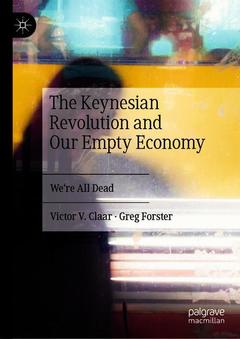The Keynesian Revolution and Our Empty Economy, 1st ed. 2019 We're All Dead
Auteurs : Claar Victor V., Forster Greg

This book considers the cultural legacy of the Keynesian Revolution in economics. It assesses the impact of Keynes and Keynesian thinking upon economics and policy, as well as the response of the Chicago and Austrian schools, and the legacy of all three in shaping economic life. The book is a call to restore economics to its roots in moral and cultural knowledge, reminding us that human beings are more than consumers. The Keynesian Revolution taught us that we should be happy if we are prosperous, but instead we feel hollow and morally anxious ? our economy feels empty. Drawing on paradigms from earlier historical periods while affirming modern market systems, this book encourages a return to a view of human beings as persons with the right and responsibility to discover, and do, the things in life that are intrinsically good and enduring. Because in the long run, the legacy of our choices will continue long after ?we?re all dead.?
1. Introduction: Work Hard and Play by the Rules
Part I: The Stakes
2. From Socrates to Smith: The Moral and Cultural Foundations of Economics
3. Just the Facts, Mammon: Modern Aspirations to Moral and Cultural Neutrality
Part II: The Keynesian Revolution
4. Keynes’ Revolutionary Vision: Consumer Satisfaction as Moral Crusade
5. Forging the Consumption Paradigm: A Morally Neutral Moral Crusade
6. “We Are All Keynesians Now”: How the Revolution Transformed Our Economy and Culture
7. Two Counter-Revolutions: The Chicago and Austrian Schools and the Consumption Paradigm
Part III: Hollow Prosperity in the Empty Economy
8. Pull Your Own Weight: Moral and Cultural Conditions for Productivity
9. Leave It Better than You Found It: Moral and Cultural Conditions for Stewardship
10. Respect Other People: Moral and Cultural Conditions for Human Dignity
11. Putting First Things First: Moral Consensus for a Flourishing Economic Culture
12. Conclusion: Toward a Moral Consensus Paradigm
Victor V. Claar is BB&T Distinguished Professor of Free Enterprise at Florida Gulf Coast University, where he is an Associate Professor of Economics. He is the coauthor (with Robin Klay) of Economics in Christian Perspective. Prof. Claar also serves as an Affiliate Scholar in Economics at the Acton Institute.
Greg Forster is Director of the Oikonomia Network, a learning community for theological educators, and also serves as Visiting Assistant Professor of Faith and Culture at Trinity International University. He is the author of nine books and co-editor of four books. Dr. Forster is also a senior fellow with EdChoice.
Analyzes the moral implications of the Keynesian Revolution in economics for today’s world
Explores the economics field’s move away from its foundations in moral and cultural knowledge
Considers our polarization and moral anxiety in light of economic, philosophical and religious thinkers
Date de parution : 05-2019
Ouvrage de 345 p.
14.8x21 cm
Disponible chez l'éditeur (délai d'approvisionnement : 15 jours).
Prix indicatif 116,04 €
Ajouter au panier


